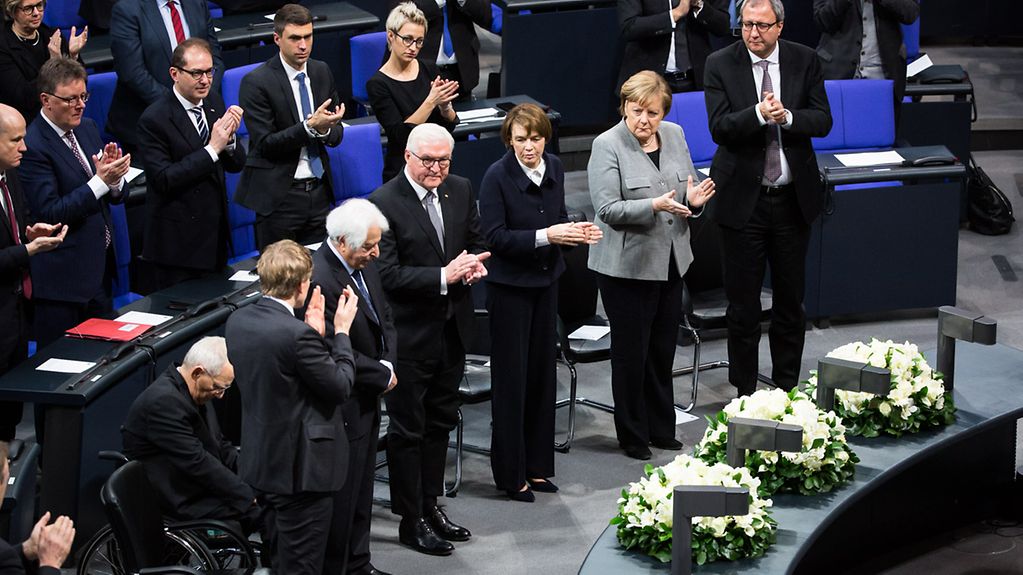Der Link wurde in Ihrer Zwischenablage gespeichert
The German Bundestag has paid tribute to the victims of National Socialism at a remembrance ceremony. The Chancellor also attended. Professor Saul Friedländer was the main speaker. A historian, who experienced the Holocaust first hand, he gives murdered Jews a voice. For this he was awarded the Peace Prize of the German Book Trade in 2007.
2 Min. Lesedauer

Professor Saul Friedländer is a historian and experienced the Holocaust first hand. He was the main speaker at the commemorative ceremony in the German Bundestag.
Foto: Bundesregierung/Steins
74 years after the concentration camp in Auschwitz was liberated, the German Bundestag has paid tribute to the victims of the National Socialist dictatorship. Millions of people – most of them of the Jewish faith – died in Nazi concentration and extermination camps.
Alongside Chancellor Angela Merkel and Federal President Frank-Walter Steinmeier, representatives of all other constitutional organs of the Federal Republic of Germany attended the ceremony.
"I see Germany today as a radically different country, " said Professor Saul Friedländer, who gave this year’s commemorative speech. "All of us hope that it has the moral fibre to continue to fight for tolerance, humanity and liberty – in other words for true democracy."
Saul Friedländer was born in Prague in 1932 into a German-speaking Jewish family. He survived National Socialism under a false name in a Catholic boarding school in France. His parents were murdered in Auschwitz.
After the end of the war, Saul Friedländer emigrated to Israel and taught at the Hebrew University of Jerusalem, Tel Aviv University and the University of California, Los Angeles. His work as a historian has brought him numerous renowned awards including the Pulitzer Prize and the Peace Prize of the German Book Trade.
In her podcast on Saturday (26 January) Chancellor Angela Merkel called for memories to be kept alive. Every one of us, she said, has the duty and the responsibility to ensure that we have zero tolerance for anti-Semitism, inhumanity, hatred and racial fanaticism.
"No nation can choose or reject its own history. History is the prerequisite for the present, and the way a country deals with its history is the foundation for the future of that country. From Germany’s guilt arises our responsibility not to forget," underlined Bundestag President Wolfgang Schäuble in his speech. A culture of remembrance is thus not only something for civil society, declared Wolfgang Schäuble. "It is one of the duties of the state."
"Saul Friedländer has set yardsticks in investigating the Holocaust," said the Bundestag President. "It is shaming for us that once again Jews are considering emigrating from Germany because they no longer feel safe in our country." But shame alone is not enough, he declared. "As well as the full force of the law, what is needed in our everyday life is for us to counter anti-Semitism, racism, and discrimination of every sort," warned Wolfgang Schäuble.
27 January is the Day of Remembrance for the Victims of National Socialism. It was established by proclamation by Federal President Roman Herzog in 1996. On 27 January 1945 the concentration camp in Auschwitz was liberated by Soviet troops. Some 1.1 million people were murdered there. Every year since 1996 a remembrance ceremony has been held in the German Bundestag to pay tribute to the victims of National Socialism.